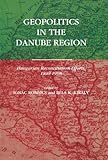Geopolitics in the Danube Region : Hungarian Reconciliation Efforts, 1848–1998 / ed. by Ignác Romsics, Béla K. Király.
Material type: TextPublisher: Budapest ; New York : Central European University Press, [1998]Copyright date: ©1998Description: 1 online resource (429 p.)Content type:
TextPublisher: Budapest ; New York : Central European University Press, [1998]Copyright date: ©1998Description: 1 online resource (429 p.)Content type: - 9789633864616
- 327.439 21
- DB926
- online - DeGruyter
| Item type | Current library | Call number | URL | Status | Notes | Barcode | |
|---|---|---|---|---|---|---|---|
 eBook
eBook
|
Biblioteca "Angelicum" Pont. Univ. S.Tommaso d'Aquino Nuvola online | online - DeGruyter (Browse shelf(Opens below)) | Online access | Not for loan (Accesso limitato) | Accesso per gli utenti autorizzati / Access for authorized users | (dgr)9789633864616 |
Frontmatter -- Contents -- Contributors -- Preface to the Series "Atlantic Studies on Society in Change" -- Plans and Projects for Integration in East Central Europe in the 19th and 20th Centuries: Toward a Typology -- The Beginnings -- Miklós Wesselényi on the Future of the Habsburg Empire and Hungary -- The Hungarian Nationalities Act of 1849 -- Crossroads Between Revolution And The Compromise (1849-1867) -- Lajos Kossuth's Role in the Conceptualization of a Danubian Federa-tion -- Dialogue among Hungarian and Romanian Exiles, 1850-51 -- Era of Dualism(1867-1918) -- József Eötvös and Ferenc Deák: Laws on Nationalities -- Lajos Mocsáry's Political Theory of National Minorities -- The Hungarian-Croat Compromise of 1868 -- Era Of Upheavals (1918-1998) -- Conceptual Changes on Central European Integration in Hungarian Political Thinking, 1920-1948 -- Oszkár Jászi's Danube Federation Theories -- Transylvanism: Revision or Regionalism? -- István Bibó on the Conditions of Danubian Reconciliation -- National Independence, Neutrality, and Cooperation in the Danube Region: Imre Nagy's Foreign Policy Ideas -- "Why Did the Danubian Federation Plans Fail?" -- Present and the Future -- The Protection of National and Ethnic Minorities' Rights in Hungary (1989-1997) -- Bilateral Treaties between Hungary and its Neighbors after 1989 -- Biographies of Key Personalities -- Basic Bibliography -- Maps -- Name Index -- Geographical Index
restricted access online access with authorization star
http://purl.org/coar/access_right/c_16ec
Central and Eastern Europe has a long history of, on the one hand, ethnic conflicts and, on the other, of a revolutionary tradition against expansionism. Both have their roots in the geographical situation and ethnic composition of the region. All these problems have surfaced at times when the political status quo has been upset for some reason, such as after the two world wars and after the collapse of the Soviet Union. Both great powers bordering the Danube region-Germany and Russia-have strived to develop their own versions of confederations (Mitteleuropa and Pan-Slavic movements). Also, politicians and intellectuals of the countries affected have proposed various theories, and made initiatives for different forms of closer or looser confederative formations. This book examines the reasons for the failure of these initiatives, these reasons including such factors as ethnically-motivated political antagonism, and the lack of economic complementarity. Contributing valuable information on the problems of political and economic integration, which should not be forgotten in a period when the countries of the region are looking towards the European Union, expecting-realistically or not-the solution of their various conflicts.
Mode of access: Internet via World Wide Web.
In English.
Description based on online resource; title from PDF title page (publisher's Web site, viewed 28. Mrz 2023)


